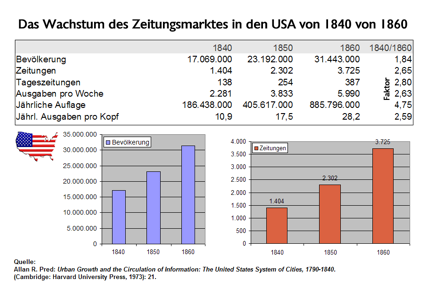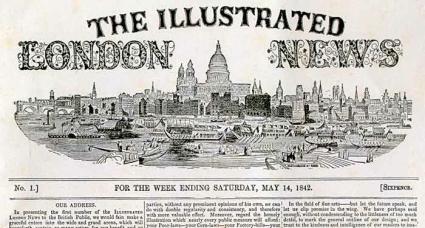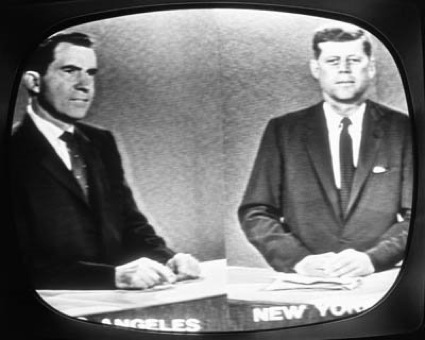 |
|
StefanL, 16.09.09, 22:24
In our last installment, with the help of Dealing With Darwin by Geoffery Moore, we have analyzed the somewhat schizophrenic double business architecture of mass media. Today we will look at the last 150 years to see the beginning and end of that uncommon model, a thing that, judged from pure abstraction, should not have happened.

Beginning: The Penny Press
Historically seen, mass media are a relatively young phenomenon. They sort of started their life with mass bible reading enabled through the printing press, but began in earnest with penny newspapers in the United States and later Great Britain. The sixfold price decrease was enabled by two factors: progress in printing technology and a corresponding rise in the possible advertisement revenue. That rise in turn was enabled by the creation and quantitative growth of mass marketable product. This really diffused the press and reading into the so called masses (as opposed to literate elite).

Before the penny papers came the sixpence papers, illustrated
It also established the double business model of mass media in place to this very day. The principal customers underpay the product and the gap is filled by selling the eyeballs (and eventually the ears) of these same customers to totally different customers who want to talk to those eyeballs, ears and the brains and souls behind them. (Before that there had been announcements which should not be confused with advertisement as we now understand them.)
1st Modification: Sound Broadcasting
Radio comes to the mind when thinking about the next step. The phenomenal success of the private radio market in the US is often quoted for the next step in mass media development. For many people radio is the proof for the possibility of products that are freely given to customers. But that is not quite true. The commercial success of radio in the US was based on the progress of the consumer product industry on one hand and on the full integration of nearly all elements of the architecture by companies like Radio Corporation of America on the other. The business model started with the consumer buying reception and playback devices every couple of years from RCA. For a nice sum, that is. RCA also provided everything else: production equipment, programming, content, management, integration technology, organization of sound artists, ad sales etc.
2nd Modification: Television Broadcasting
As all who know, know, that integration model did not work out anymore with TV after WWII. But even without all of that TV became a large business because of the unforseen enormous rise of the advertisement needs of both the industry and the services sector and because TV is and remains the most powerful ad platform ever invented. But its rule is far and out not as complete as it used to be anymore.

Excursion: Publicly subsidized commercial online success: the minitel
3rd Modification: Interactive media through all-purpose small computers, many trials, groping in the dark, finding success
From 1996 to 2000, after realizing that the founders of Netscape Corporation had made gross and obvious errors in their initial business plan spreadsheets, Netscape, Oracle, Sun and their allies all tried to repeat successful American radio network model with intentionally crippled and controlled devices called NCs or Network Computers. Oracle even trademarked the term. Only in the state of states, France, with heaviest support from the government and direct political coercion of the users, did such a strategy (Minitel) succeed with computing devices in the first round.
Until today, Sony, Nintendo, MSFT and Apple are the companies that have created mass media in the good old Radio way. In the electronic games and entertainment market you sell the device upfront and the content after that. Piracy exists and poses a threat (compare this to people who watch TV without paying for cable or public broadcasting, Schwarzseher in German).
Then Apple led the crowd with its line of iPods and a lot more important by the iPhone and the iPad and have really succeeded in reproducing at least a large part of the integrated RCA business model. Even Google nowadays design smartphones to go with their software. One cannot exactly say that smartphones are crippled devices if one thinks of all the sensors, processors and memory built into them. But these companies as a whole have succeed in making these powerful devices pretty much dependant on the net and the cloud. They even gave up on a once big ideal of PC software, namely that as opposed to the mainframe world you could by software and use it as long and as often as you wanted whereas today you can practically only rent the most widely spread professional software tools.
In the games sector Blizzard were among the early successes trying out the subscription model as opposed to bying games for your kids at Christmas time and be done with the costs. Many relevant actors in the quintessential "free" medium markets, TV channels and most new audio services are returning (HBO - 38M subscribers, Netflix - 40M+ subscribers, Spotify, Pay Radio ...). Still, the successes are few and far between. Many of these companies offer a hybrid model from the start and other will start to succumb to the lure of advertisement money. Expect in-game-advertizing to modify the games market in the years to come. Expect others to try to modify and optimize the exisiting hybrid models.

For professional politicians Video-Images in any form became and remain the figure before the hypnotizing 50 or 60Hz ground
Exception: The thing that was able to confuse many brains
Until here we have intentionally written very little about television, the medium that has the reputation of having changed everything in the (mass) media business. Looked at seriously it is still by far the biggest thing in media but has lost its commanding role nearly completely in the past ten years.
The mass media double business model came to its climax and full fruition in the 60 years of the rise of commercial television (1941-2001). We won't write anything more here than that TV has earned the merit of expanding the commercial volume of mass media by a third which is no mean feat. Tons and tons of research on TV have been published, so everybody can look and read for themselves. And do not forget how companies like RCA and Columbia lost a large part of their businesses when, after the transistor, it turned out American citizens prefered Sonys and Panasonics and so on over homeland-produced all-American Mr. TVs.
Today we can sit in the front row and watch as the schizophrenic mass media business model is dying its very very slow death. After 140 years of huge but often dubious successes it is falling apart before our eyes. It does so from inner development and because, in the end, structural problems prevail against opportunity. Radio was able to feed on the mass uniformity the press had created. TV fed on the hot and hypnotized mass uniformity Radio had put on top of and into it. It did so by giving a relief right after the big war and by cooling everthing down. What does the interactive nature of the internet do? What does the change from cooling down tube devices to hot high resolution LCD and LED screens do? It seems not many people want to find out. Everybody is in the hamster wheel but some grumpy old professors and some esoteric ladies and guys who have their followers but no real power.
The Happy Ending
But now the wave hast started to roll back. All of the twentieth century the telephone has counteracted mass media in the invisible and unhearable background. Since it has been released from its bond to the wall, all figures we see rather show that the amount money people spend for electronically supported communication has neither risen nor fallen dramatically, it seems.
Just who is allowed to talk to who, who listens to who, watches whom and where and when this happens seems to be changing quite a bit. What it is that people talk about on the phone and post on networks from their ever more powerful phones has raised peer pressure and group conformity considerably while on the other hand segmenting and fragmenting the once huge and pretty uniform groups ever further.
Globally connected telephones constitute the largest network on this globe and that networks' potentials gets more and better all the time. All forms of peer control and politics in most social groups are rapidly changing and all the patterns ripple and waver. Waver through phones and pods and PCs and warez and what have you. New things emerge.
Interesting times. And dangerous. Like all such. Let us be glad that thanks to atomic proliferation for the time being large scale land wars between the great powers are somehow out of the question. But one has to say, it is high time politics and the media get their act together and instead of running after the masses take their responsibility and start to change their ways in earnest. Ahead of all they must become more modest (real and really, not as a form of play-acting in front of cameras and mics) and think about how these new segmented groups can find common ground.
For this they need to become less competitive, more cooperative and not just in uneasy coalitions but in a sustainable manner. It will need a new generation of players on one hand, friendly continuity and competent handovers, it seems. Not a all around fetishization of "creative destruction". And hopefully these new peopl will not just play the same game as all the elites of the last 2000 years when they got ready to replace the former one. Some things have gotten better from the penultimate generation to the last one. But in some respects it would be good to consider if the pendulum did not swing back a bit.
Jump back to part 1 of this series
|
|
 |
last updated: 15.08.25, 06:48
Youre not logged in ... Login
 ... antville home
Terms of Service
About us / Imprint
| Februar 2026 |
|---|
| So. | Mo. | Di. | Mi. | Do. | Fr. | Sa. |
|---|
| 1 | 2 | 3 | 4 | 5 | 6 | 7 | | 8 | 9 | 10 | 11 | 12 | 13 | 14 | | 15 | 16 | 17 | 18 | 19 | 20 | 21 | | 22 | 23 | 24 | 25 | 26 | 27 | 28 | | August | | |
    I totally agree
mit der Meinung, dass das Hemisphärenmodell überholt ist.
Die mediale Lust am Untergang hat wohl ein rational kalkulierendes Element auf der einen und massenpsychologisches Element auf....
by StefanL (12.07.25, 21:26)
D'après ce que je vois
vous avez tout à fait raison, Mr. Tobi.
by MaryW (01.03.25, 08:34)
...
La crisi consiste appunto nel fatto che il vecchio muore e il nuovo non può nascere: in questo interregno si verificano i fenomeni morbosi piú....
by tobi (28.02.25, 16:22)
...
Haschimiten-Familie
Vater:Husain ibn 'AliEmir von Mekka von 1908 - 1916König des Hedschas von 1916 - 1924
Sohn Faisal:Verhandlungsführer der "Araber" in Paris König des Irak von 1921....
by StefanL (19.01.25, 06:26)
Ich habe eh
einen Esseh über den Kulturpessimismus, der ja grundlegend mehr reaktionär als konservativ ist, in Arbeit. Wird aber noch dauern.
by StefanL (10.01.25, 23:50)
Jaaa!
Ich geb ja gerne zu, dass der Neid aus mir spricht. ;-)
by StefanL (10.01.25, 23:46)
...
Aha soso ein Professor h.k. (honore kurza).
by tobi (10.01.25, 23:30)
Woher kommt diese Lust am Untergang?
Friedrich Sieburg kommentierte »die Tendenz der Medien, unentwegt den Weltuntergang durch einen Atomkrieg vorauszusagen als weinerliche, kaum zu ertragende Geschwätzigkeit. Sie sei auch deswegen absurd,....
by tobi (10.01.25, 19:18)
Read the books,
watched the series for a while. Got distracted then. Did NOT buy the T-Shirt. Interesting problem. Thanks!
Slice, slice, very slice. Thank you for not killing....
by StefanL (06.01.25, 11:39)
...
Slice, slice, very nice.
by tobi (05.01.25, 23:31)
...
😻
by tobi (18.12.24, 12:27)
We could just barely
keep the censor's office and the press team of the president-elect from intervention but here are our apologies and our thanks for these valuable hints....
by MaryW (17.12.24, 23:37)
...
The (correct) first name of Mr. Zelenskyj is the Ukrainian Володи́мир, not (of all things) the Russian Влади́мир 😿
Second name is Oleksandrovych.
Ложка дьогтю у бочці....
by tobi (16.12.24, 19:15)
Du hast recht,
Universal-Genies brauchen wir echt keine mehr. Ich wollte eh nur sagen:
Things are going to slide, slide in all directions.
Won't be nothing, won't be nothing you....
by MaryW (31.10.24, 23:13)
...
Hm. Ich glaub, da gibt es schon noch einige Kandidat*innen. Mir fällt spontan Lisz Hirn ein. Ich fürchte nur, die schaffen es nicht mehr, so....
by tobi (03.10.24, 19:21)
Das sind
wirklich die allerletzten, diese Streberschweine. Aber sonst auch.
by StefanL (18.09.24, 08:42)
Es gibt sogar
Verbrecher, die das ganze WE zusätzlich durcharbeiten, um Pegelkarten zu bauen. Das sind dann die allerletzten.
by gHack (17.09.24, 18:56)
Geändert
Inzwischen hat Herr Fidler den Fehler erkannt und korrigiert sowie sich inzwischen bei den LeserInnen entschuldigt.
Nur damit das nicht untergeht. Wir haben hier in der....
by StefanL (21.02.22, 09:17)
There has been evidence
that the important and successful ideas in MSFT - like licensing the Unix source code in the 70ies and learning from it and licensing QDOS....
by StefanL (02.01.22, 11:18)
Now
I think I maybe know what you meant. It is the present we know best and the future we invent. And history is mostly used....
by StefanL (02.01.22, 09:51)
???
Hey, it's just a phrase wishing to convey that you're always smarter after the event than before it.
by StefanL (28.12.21, 07:35)
Addendum
Oracle is now mentioned in the English Wikipedia article on teletext and even has its own article here. Electra has one too.
by MaryW (22.12.21, 07:11)
We have grossly erred
At least in point 5. We thought, people would have come to the conclusion that permanently listening to directive voices as an adult is so....
by MaryW (21.12.21, 07:42)
Did not want to spell the names out
Ingrid Thurnher should have been easy, as she is pictured in the article. Harald F. is an insider joke, the only media journalist in Austria,....
by StefanL (19.12.21, 08:45)
...
with four letters it becomes easier though i am not sure with hafi… anyhoo, inms guessing acronyms or whatever this is.
*it’s not my steckenpferd
by tobi (24.11.21, 20:49)
  |









